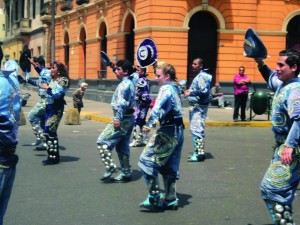
Courtesy of Natalie Peterman
There’s something about the intensity of change that being immersed in a foreign culture inspires. The experience doesn’t stop when you leave; it makes you want to tell the world about every interaction, awkward moment and gem produced from enlightening chaos.
You could say that’s why I decided to write a “part two” to my previous study abroad piece, published on Sept. 29, 2011, but in this article I will focus on the importance of the people who gave me my experiences.
When I think about my time in Peru during the Fall 2011 semester, three adventures come to mind. The first is a haphazard fishing trip with a French exchange student named Pernelle and a couple of scallop fishermen during a weekend getaway in Pisco. The second of the three is the parade in which I danced through the streets of Lima with my friend Jeca’s Caporales group — a Peruvian folk dance group — and the third is the week-long trip I took, alone, through southern Peru. More specifically, that trip sparks memories of my day at Machu Picchu and the Limeñan woman who adopted me.
Pernelle and I had been aching to get out of the permanently cloud-covered Lima for weeks, and we finally got our chance one October weekend. Pisco, a small fishing town, seemed more alive with people than the automobile-infested Lima.
Once there, a series of chance meetings and conversations led to the chance to go scalloping. We jumped at the opportunity to do something even more off the beaten path than Pisco itself.
The next morning, at 6 a.m., we climbed into a 15-foot motorboat with José and Luís — two seasoned scallopers — who took us to their usual fishing grounds two hours away.
After donning rubber wet suits half an inch thick and collecting our bounty while armed with a mesh bag, Pernelle, José, Luís and I plunged into the ice-cold water and dove down again and again to collect as many of the maroon-purple shells as we could. After what seemed like hours, we were hoisted back into the boat before meeting up with another fisherman — Miguel — in a nearby cove. Then, Miguel, José and Luís tied the boats together and, to our surprise, prepared the most delicious scallop ceviche known to mankind. That was the last scallop ceviche I will ever eat.
I met Jeca at the catholic university I studied at in Lima. We both shared a love for dance, so she took me to her dance group, which really should be called a brigade because it’s run like a boot camp and consists of at least 100 male and female dancers.
I went week after week and tried my best to memorize the various numbered sequences and the chants that go along with them. Finally, it was announced that Lima was going to have a parade celebrating ethnic cultures, and that we were going to dance in it.
Excited and terrified, I decided to dance “machita,” meaning that, as a woman, I would dance the man’s part. When the morning of the parade finally arrived, we suited up and boarded the bus packed with countless other vibrantly-costumed dancers.
Once in the center of the city, we took our places until our band began to play. The lead called out the sequence, “Uno, Lima,” and off we went. In the middle of a group of Peruvian men wearing baby-blue velours, sequined suits and boots three sizes too big, I jumped, skipped, kicked and shouted through the heated streets of central Lima.
At the finish line two hours later, I didn’t want to stop, though one of the best parts of the parade was the mix of hugs and congratulations I received from my male comrades. I was no longer the “gringa,” but instead the “machita.”
Jeca and I still keep in touch, and the memories of all the open-mouthed stares, shouts and shots of pisco that onlookers gave me still make me smile.
Mention Peru, and someone will inevitably bring up Machu Picchu, which was, without a doubt, the most tourist-infested place I visited on my excursion. But after seeing it, I can’t help but understand why. Apart from the sheer majesty of the place, Machu Picchu’s spirituality is mystical and brings you to your knees.
I was ready to explore the site alone, hoping to find every undiscovered (or so I liked to think) corner of the magnificent wonder. Then, Chela found me. She was a 62-year-old woman from Lima visiting the famous jewel of her homeland for the first time in 50 years.
Chela needed a daughter and decided I could use a mother, so she asked me to sit with her on the train ride to our destination. We chatted and got to know each other. She seemed much younger than her years both in conversation and in the way she dressed.
She was well-put together, dressed in a knit sweater and leather heeled boots, while I wore jean shorts, a T-shirt and hiking shoes. We must have made quite the pair.
One jam-packed bus ride later, we finally arrived at the top of Machu Picchu. Our tour through the abandoned city took us up and down countless stone stairs, which I helped her navigate. Each time she thanked me with an, “Ay Natalie, gracias mi niñita, mi amorcita,” which translates to “Thank you, my darling Natalie, my sweetheart.”
I thought I wanted to explore Machu Picchu alone, to be the lone voyager who discovers the undiscovered. Not only did I find out how nearly impossible that would have been, but also how enjoyable unexpected company can be. Thanks to Chela, I will definitely head back to the site someday. I left a lot “undiscovered.”
My two semesters abroad — this past one in Peru and the one spent in China in the Spring 2011 semester — were the greatest adventures of my life thus far. I grew in ways I never could have imagined and owe much of that to the people I met. If there is anything I want this article to encourage, it’s openness to the unexpected adventure.
If you aren’t a senior, you still have time to go find yours by studying or interning in another country. Opportunities like the Gilman Scholarship can help make your adventure a reality.
Of course, I think you should spend a semester in China and Peru, in that order, but no matter where your adventures take you, be open to change and embrace the unexpected. You’ll be surprised by where you find yourself, whom you meet and what you learn.
Peterman is a member of the class of 2012.





